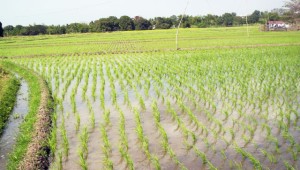
Niger State is presently cultivating 371,482 hectares of rice, mostly under the production season of rainfed.

Niger State is presently cultivating 371,482 hectares of rice, mostly under the production season of rainfed.
In the bid to promote inclusive clean energy access and empower rural women to rise out of poverty, a special training and skill acquisition workshop will hold in Abuja from Tuesday, 25 to Friday, 28 August 2015. It is the Maiden Edition of the Rural Women Energy Security (RUWES) Initiative Capacity Enhancement Workshop. It has “Unveiling the Potential of the Rural Women” as its theme.
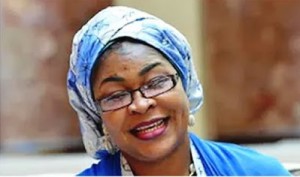
Targeted at RUWES member organisations and internally displaced women and girls, the workshop will also serve as an avenue to further strengthen the RUWES Network as a ‘Self-Help Forum’ where women and key stakeholders come together to discuss experiences, overcome challenges and grow, says an official of the United Nations Development Programme (UNDP), which is supporting the scheme.
“The RUWES Initiative aims to eradicate energy poverty among rural women and ensure that women are more energy efficient and less dependent on fossil fuels for cooking, heating and lighting using green energy alternatives. In the long term, the use of clean energy will improve health; drastically reduce deforestation and other negative environmental outcomes as a result of indiscriminate felling of trees for use as fuels,” he states, adding:
“In addition to Gender Empowerment and Climate Action, the RUWES Strategy will inform and contribute to the Post-2015 Development Agenda, potentially saving millions of lives every year currently lost to air pollution related illnesses, and avoiding more than 10 million tons of annual crop losses. We very much appreciate taking on this challenge with you.”
President Muhammadu Buhari is scheduled to play host to the visiting United Nations Secretary-General, Ban Ki-Moon, on Monday at noon, at the Presidential Villa, Abuja.
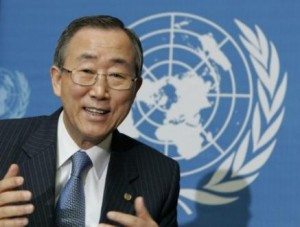
According to a media advisory signed by Oche Egwa on behalf of the Office of the Special Adviser to the President on Media and Publicity, Buhari and Ki-Moon will address a joint press conference at the end of their closed-door session. The meeting is scheduled to hold at noon.
Ki-Moon, according to the statement, will later return to the Presidential Villa for a dinner to be hosted in his honour by the President.
The dinner is billed for the new Banquet Hall of the Presidential Villa by 7pm.
Similarly, the UN Secretary General will meet with 10 young leaders to answer questions on development, climate change and the role of young people. Ahead of the meeting, some delegates would be live on radio: Cool FM (96.9) 9:00 – 9:20 and Nigeria Info FM (95.1) 2:00pm – 3:00pm all GMT+1.
In the light of the large usage of Twitter by young people in Nigeria, there will be a TweetMeet Session that will provide a platform for young leaders and colleagues to discuss development and their role in shaping a better future for all.
It holds on Monday, August 24, 2015 by 5:30 – 6:30 PM GMT+1. The Twitter Channels are: #Action2015NG #SDGs and #SDGsNG @UN_Spokesperson @mcampaign.
The goals of the event are to:
Twitter handles of the Young Delegates who will be representing Nigerian Youth: @missamah05 @estherclimate @mareeyama @rotexonline @vinnydrey @edwindaniels @christyasala @ojonwa @SpeshYh @Hamzy12.
It is fortuitous that the People’s Democratic Party (PDP) has given the indication that a new national chairman will emerge by September, 2015 when the party holds a special convention for that purpose. It is a sure sign that the PDP is ready to reinvent itself after a woeful loss in the recent general elections. The party has similarly indicated its determination to snatch power from the ruling All Progressives Congress (APC), which came to power May 29, 2015.
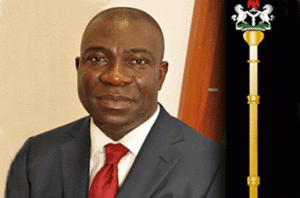
Ordinarily, the announcement of the impending new national chairman for the PDP should elicit wide applause from the polity and expectations from party faithful across the country of a possible titanic challenge to the APC in the 2019 general elections. The founding fathers of the PDP should also be elated by the good news coming from the party’s national headquarters in Abuja, the Federal Capital Territory of Nigeria.
Earlier, the party had constituted a fact-finding committee headed by Deputy President of the Senate, Senator Ike Ekweremadu, on why the PDP lost in the last elections. Former President Goodluck Jonathan, who is on record as the first incumbent to have lost and conceded defeat in the country constituted the panel. This was after an unbroken 16 years rule by the PDP.
Why did President Muhammadu Buhari and his party, APC, defeat Jonathan and the PDP? How can the party return to power in 2019. How should the PDP function as an opposition party? What are the lessons to be learnt, if any from the loss, and what remedies could be prescribed to mitigate the impact of the defeat? These are some of the questions the Ekweremadu committee was meant to find answers to.
From the announcement of next month’s national convention it would seem as though the work of the Deputy President of the Senate has been concluded and the recommendations of the panel accepted. It is not clear however if the committee has been disbanded or would continue on the path of midwifing the party once again to victory.
But it is sad that the PDP leadership by the announcement of a national convention next month is yet to come to terms with the enormity of the problem at hand and how to get out of the hubris to face the reality of the task at hand. Either that or the party is still consumed by an inebriated reverie.
Definitely, a convention to elect a new chairman seems right and equitable given the existing zoning structure of the PDP. I cannot however see why it is propitious to do so at this moment. Because the leadership should have realised that the panacea needed to take the party forward and beyond its present state of near comatose is the rebuilding of structures from the scratch. That is from the grassroots to the national level. Anything short of this would yield a worse result from that of the 2015 polls.
From the signs put out by the current leadership headed by acting chairman, Uche Secondus, members of the NWC are determined to hold on to their portfolios and hope that the election of a new chairman would provide the badly needed catalyst that would return PDP to its former winning ways. An action akin to pouring fresh wine into an old, disused and dirty bottle.
Secondus and his co-travellers in the NWC ought to have realised by now that it was not the former national chairman, Alhaji Adamu Mu’azu that made the PDP to lose the last elections. Therefore the resignation and subsequent replacement of Mu’azu would not affect the party in any way, positive or negative. Only a radical clearing of the augean stable is capable of injecting fresh tonic for the PDP to return to its once boisterous path.
Nigerians are convinced that members of the NWC are filthily corrupt, selfish and greedy. The recent allegations of mind boggling misappropriation of funds running into billions of naira against key members of the NWC reinforces the belief that the national secretariat of the PDP is a bleeding sepulchre. Notwithstanding that there may be some untainted by this corruption perception.
Interestingly, the acting Chairman of the Board of Trustees, Alhaji Haliru Bello Muhammed, in a shameless bid to wash his hands off the party’s woes disclosed that the PDP lost the last elections because it adopted President Jonathan as its sole candidate in flagrant disobedience to the established rule of zoning and equity. Yet it was the same BOT boss who moved the motion for the adoption of the former President a year ago, in defiance of the voices of reason, good conscience and the wish of the founding fathers that the ticket should be zoned to the North for an equitable contest. well-meaning Nigerians and PDP faithful should therefore impress it on Muhammed and entire apparatchik of the party that it is time to give way to new faces, new voices and new messages that resonate with the wish of the ordinary man, who in any case constitute the bulk of the electorate. Anything short of this is a sure panacea for failure.
The PDP is in urgent need of a credible and charismatic leadership. The current players in the BOT and NWC most of whom are tied to the umbilical cord of the last administration must now out for a new set of players. Surely the party is not only a nest of thieves as the rival APC would want us to believe. There must be men with elevated ethos and patriotic zeal within its fold.
Only recently, the filthy condition of the national secretariat of the PDP has become an issue for intense debate in the social media. This is following after the planned reduction in the workforce by half and slashing of salaries of the workers by 50 percent. All these taking place barely three months after the party vacated power at the centre.
Of course, these are signs of structural disequilibrium which when not addressed would lead to the ultimate destruction of the party. Has anyone done a proper audit of the staff at the secretariat known also as Wadata Plaza? What known or objective criteria was used in the recruitment? Why is the party still being run as an old or broken down colonial office? Does the PDP have an authentic and verifiable data base of party faithful from inception till date?
What most Nigerians do not know however is that Wadata Plaza is a rented block of offices donated by the late Waziri Ibrahim for the party to take off in 1998. No effort has been made to erect a befitting and permanent structure since then. No wonder it has remained disorganised and subject to several interminable manipulations. Indeed one can never be sure what to expect from the PDP National Secretariat each time a complaint, petition or matter is taking there.
It is against this backdrop that I would suggest that large chunk of money realised in the sale of governorship forms in the forthcoming elections in Bayelsa and Kogi states should be devoted to the building of a modern, fully furnished, computerised and permanent edifice. Moving away from its present location is one great way to let the people know that PDP is embarking on a path of redeeming its badly battered image.
Similarly, the party must embark on a fresh membership drive backed by a fully automated data centre, the type set up by the APC in the days leading to the last elections. Members who subscribe must also pay registration fees and annual dues which in turn would become veritable source for raising funds to run the party. Once the process is transparent and accountable, it would engender confidence difficult to break.
Of course, it may be appropriate to inform the leadership that only few Nigerians share in the optimism that the PDP would return to power in 2019. This is because the change mantra which ushered the APC to office has not diminished. If at all, most people are hopeful that the ruling party and President Buhari would keep to the promise of probe and sending corrupt persons to jail, at the least. Once that is done, it may be difficult convincing the people not to vote APC in the next general elections.
Instead, the emphasis should be on how to reverse the majority in the national assembly in favour of the PDP as well as win more states. This can easily be achieved if internal democracy is entrenched and only popularly electable candidates are allowed to fly the party’s flag at all levels. Again, party faithful who lose in a well contested and transparent primary are not likely to defect, thereby guaranteeing cohesion and a united front in a general election.
By and large nobody is advocating that the PDP should invite or import people from the moon and other places in outer space to take over the leadership of the party. Neither is it expected that the negative perception of sleaze could be wiped out overnight. But a determined effort to revamp the structure and elect credible leadership at all levels would definitely elicit positive vibes from the citizenry.
Anything to the contrary is a clueless march to hades, a mindless circumspection that ends in abyss. Definitely, it’s a sure panacea to keep the PDP perpetually on the brink. No one wants that.
By Felix Ofou (a former Editor who lives in Lagos)
The adoption of Carbon Pricing as a key strategy to reducing global carbon emission received a major endorsement recently in Lagos, where stakeholders gathered at a daylong forum to explore inherent modalities.
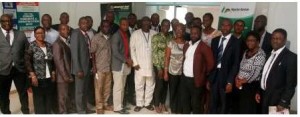
The Breakfast Dialogue on Climate Change, Carbon Pricing and Renewable Energy held on Tuesday, July 18, 2015 at the instance of the Carbon Exchange Trade, SMEFUNDS, Nigeria-German Business Association and the New Nigeria Foundation. The Dialogue had in attendance representatives of corporate business and civil society communities, foundations, research organisations, business associations, the media and academia.
The key outcome of the meeting was the formation of the Carbon Pricing Leadership Coalition Nigeria. With this development, the nation’s Coalition becomes the latest to partner the World Bank’s Carbon Pricing Leadership Coalition, which already has about 15 countries.
The conversation at the Dialogue centred on the theme: “Climate Change, Carbon Emission Reduction & Economic Diversification Taking Action for Sustainable Future”. Through one key and three intervention presentations, the issues of global warming, impacts mitigation, economic and environmental resilience, energy efficiency and investments as well as ultimate emission reduction and wealth creation through carbon pricing were highly espoused and discussed.
Participants at the Dialogue observed that Nigeria must not lose the current opportunity in contribution to the regulations and implementation strategies in the Sustainable Development Goals (SDGs) starting September 2015. They particularly frowned at how the country had stood aloof without tapping into the groundswell of opportunities to wealth creation and economic diversification provided by climate change, renewable energy and particularly in the carbon pricing mechanism. They insisted that China, California, Germany and Sweden had scaled up their renewable energy deployment through carbon pricing and trading regulations, and which is an opportunity available to Nigeria given its huge presence in global fossil fuel trade.
According to the organisers, the Carbon Leadership Pricing Coalition was formed, among other things, to:
Over 30 participants signed and endorsed the Coalition.
Besides endorsing the formation of the Carbon Pricing Leadership Coalition in the country, participants also requested that the Nigerian government take opportunities in Carbon Pricing through appropriate policy and regulatory provisions as well as stakeholder engagement to enable private sector activism and wealth creation which will empower the economy for diversified growth through investments growth in renewable energy and energy-efficient projects.
This, they reason, will spin-off employment creation through economic diversification, increased health and food security and ultimately revenue generation and financial security for government.
Similarly, they invited key economic and policy actors to take part and explore opportunities presented in the activities the Coalition will be implementing to promote the initiative.
They also agreed on regular Breakfast Conversations to intensify both knowledge and activism on the issues. The next meeting will hold in September.
Innocent Azih is the interim leader of the group, while Professor Femi Ajibola drives the initiative.
Meanwhile, towards preparation for its effective participation during the 21st Session of the Conference of the Parties (COP21) to the United Nations Framework Convention on Climate Change (UNFCCC) holding in Paris in December, Nigeria will for two days from Wednesday August 25, 2915 in Abuja convene a training/workshop session.
Besides formally inaugurating its team of Negotiators at the global forum, participants will reflect on the current negotiation text, to cluster negotiating teams along the thematic negotiating issues.
The Stockholm Industry Water Award (SIWA) was on Sunday, August 23, 2015 in Sweden awarded to CH2M, a global service and engineering company, for developing and advancing methods to clean water, and increasing public acceptance of recycled water.
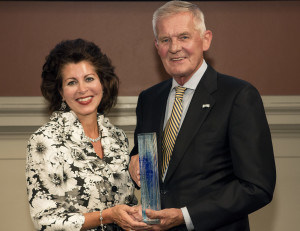
“CH2M is thrilled to be the recipient of the 2015 Stockholm Industry Water Award. The advances in water re-use technology developed by CH2M have helped revolutionise water re-use and availability, and build safe long-term water supplies for communities around the world. But without our clients, none of this would be possible,” said Jacqueline Hinman, Chairman and CEO of CH2M, after accepting the award from SIWI Chairman Peter Forssman during a ceremony held at the ongoing World Water Week in Stockholm.
CH2M has invented, implemented and refined methods for cleaning used water back to drinking water quality. However, since this water is only valuable if people actually use it, the firm has put significant effort into building public acceptance and appreciation. They pioneered the application of social science to better understand the reasons why people reject the notion of reuse and what might be done to change that mindset. This research, combined with demonstrations, education and transparency has dispelled myths around use of treated wastewater and paved the way for a surge in interest in and acceptance of putting purified sewage water back in household pipes.
“CH2M’s work for public acceptance of drinking treated wastewater is impressive. They are an engineering company that has gone beyond their technical roots to work for a better world. We must focus on the water we have, and make sure we use it well and can use it again, and again,” said Peter Forssman, Chairman of SIWI.
“CH2M’s commitment to water re-use remains steadfast, and our journey continues from here. Water scarcity is a global issue that requires innovative thinking, technology and strong relationships with government and the community to solve. Receiving the 2015 Stockholm Industry Water Award is a tremendous testament to the landmark projects we have worked on with our clients around the world and the passion of our employees, who are dedicated to delivering solutions that secure a sustainable future for generations to come,” said Jacqueline Hinman.
“In a rapidly urbanizing world where the vast majority of sewage spills untreated out into the environment, the transformative technologies and strategic communication of this year’s SIWA winner has provided a significant step towards future water security of cities,” the Award Committee stated when the winner was announced in June this year.
The SIWA was established in 2000 to stimulate and celebrate outstanding and transformative water achievements by companies in improving production, managing risks, finding solutions and contributing to wise water management. The Royal Swedish Academy of Engineering Sciences (IVA) and the World Business Council for Sustainable Development (WBCSD) were partners in establishing the award, which is also supported by International Water Association (IWA) and World Wide Fund for Nature (WWF).
Founded in 1946, employee-owned CH2M is a global leader in consulting, design, design-build, operations, and programme management for government, civil, industrial, and energy clients. The firm’s work is concentrated in the areas of water, transportation, environment, nuclear, energy, facilities and urban environments. It is based in Denver, Colorado. In the 1960s, CH2M pioneered the third, advanced stage of effluent treatment by removing excess phosphorous, nitrogen and trace metals, restoring the used water of the South Tahoe Public Utility to pristine purity. In the 1970s, CH2M designed the world’s first surface water indirect potable re-use plant, improving the water quality for more than one million people in northern Virginia. CH2M continued to evolve water re-use practices and in the early 2000s worked with Singapore’s national water agency, to not only prove the safety of potable reuse, but to win public acceptance with the country’s NEWater project.
Effective August 21, 2015, SPDC JV lifted the force majeure on gas supplies to NLNG from the Eastern Gas Gathering System (EGGS-1) following repair of a sabotage leak on the line. The force majeure was declared on August 4, 2015.
 The Joint Investigation Team which visited the site found that the leak was caused by a crude theft connection, apparently installed by people who thought the line was transporting crude oil.
The Joint Investigation Team which visited the site found that the leak was caused by a crude theft connection, apparently installed by people who thought the line was transporting crude oil.
European and African scientists in a new research have warned of imminent risks posed by the increasing air pollution that could have negative impact on human health, meteorology and regional climate in West African cities.
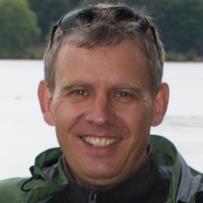
A report published by the Nature Climate Change states that the “rapidly expanding cities such as Lagos in Nigeria, Accra in Ghana and Abidjan in Ivory Coast were producing large amounts of harmful aerosols and gaseous pollutants.”
According to the scientists led by Professor Peter Knippertz of the Karlsruhe Institute of Technology, in an EU-funded research project, “Human health, food security and the climate of the region is at risk and there is an urgent need for better observations and models to quantify the magnitude and characteristic of these impacts,” the report warns.
It further explains that the West African “climate is characterized by a sensitive monsoon system which controls winds, temperature, clouds and most importantly rain. Changes in air pollutants may be causing changes in the solar heating and clouds, which in turn may lead to changes the rainfall and temperature,” the scientists say adding, “As the population of the region grows these changes may intensify.”
The scientists also warned that “the region has been, and is projected to be, subject to substantial greenhouse-gas-induced warming with the monsoonal flows particularly sensitive to the impact of aerosols.”
Professor Mat Evans of the Wolfson Atmospheric Chemistry Laboratories at the University of York said: “The story here is that climate change is happening, there’s no doubt about that. How that manifests itself with something like rainfall, which is what really matters, is much more complicated.
“If we are missing key processes in our models because we have not gone out and tested them in challenging environments then we have less confidence in what is going on.”
He advised that future policy advice be based on sound scientific observations from the region. “If you are going to make plans for how to deal with this in the future you want to do it from a position of knowledge rather than a position of ignorance. We need to get more observations in the region and we have started to do that.
“At the moment we don’t have the observations to be able to test the models to even know how good the predictions are.”
Stressing the urgent need to collect the much needed data from the atmosphere above the region, Evans said that they would need to make predictions about what they think would happen in a five-year timescale, 10-year timescale and 50-year timescale.
“The environmental degradation maybe local but the implications can be regional and global. One of the potential impacts is population migration. If people have no food because the climate is changing in their region then they will move. There are knock on effects,” he emphasised.
By Abdallah el-Kurebe, with Agency reports
About 200 houses and huts were swept away on Friday in Makurdi, the Benue state capital, following over four hours of torrential downpour. Many valuables worth millions of naira were also submerged in the flood.
Makurdi is located along the Benue River, the nation’s second biggest waterbody after the Niger.
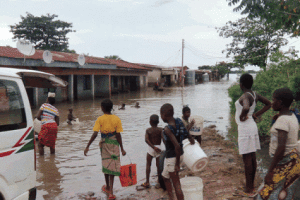
The latest incident which has taken its toll on residents was the second major flood disaster in the state capital, in the last four weeks.
The hardest hit areas included the Wurukum Roundabout and Railway Crossing, Wurukum Market, Judges Quarters on Gboko Road, Logo and Angwa Jukum, which were completely taken over by flood water
Also affected was the personal residence of the Second Republic Governor of the state, late Aper Aku, Benue State University (BSU), Living Faith and Dunamis churches, Steam fast and houses on Daniel Amokachi Avenue were all submerged in water.
Shops and stalls at the popular Wurukum Market were also not spared as most of them were filled with water, while traders battled hard to save whatever they could from the flood.
Reacting to the development, the state Commissioner of Water Resources and Environment, Nicholas Wende, lamented that the state would need about N100 billion to stem the flood menace in the state.
He said the state government had submitted a request to the Federal Government for intervention adding that the government was expecting the federal government to also assist in dredging River Benue as a permanent solution.
Wende explained that the state government had constituted a committee to identify flood prone areas with a view to taking measures to control the disaster.
World leaders, water experts and development professionals will meet for six days beginning from Sunday, August 23, 2015 in Stockholm, the Swedish capital city, to seek solutions to the world’s several escalating water crises. With both World Water Week and Stockholm Water Prize celebrating their 25th jubilee, several special events and campaign finales will take place during the Week.
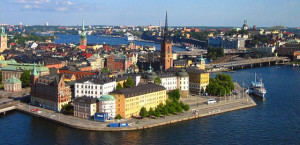
The yearly event is organised by the Stockholm International Water Institute (SIWI), a Stockholm-based policy institute that provides and promotes water wise solutions for sustainable development.
According to the body, the role of water for development, this year’s World Water Week theme, cannot be overestimated. It adds that water is the foundation for all aspects of human and societal progress.
“We need it to survive – literally, to quench our thirst, to prepare our food, and maintain our hygiene, but it is also central to economic and social development, sustainable growth, and a prerequisite for healthy ecosystems,” Britt-Louise Andersson, Communications Director, SIWI, said in a statement.
“While we need to ensure access to safe water for those 1.8 billion people who do not have it today, we must also manage the global rise in demand for water from growing economies by increasing water productivity, and find incentives for using it more effectively. Water security is both a condition for, and a result of, sustainable development.”
At World Water Week, the complex challenges related to water and development will be addressed by over 3,000 participants from some 120 countries, representing governments, the private sector, multilateral organisations, civil society and academia. Speakers at the Opening session on 24 August will include the Prime Minister of Sweden, Stefan Löfven; the Prime Minister of Jordan, Abdullah Ensour; the President of the Marshall Islands, Christopher J. Loeak; the Director-General of the International Renewable Energy Agency (IRENA), Adnan Z. Amin, and Peru’s Minister of State for Environment and President of the COP20, Manuel Gerardo Pedro Pulgar-Vidal Otálora.
During the Week, the prestigious Stockholm Water Prize will be awarded to Rajendra Singh of India, for his innovative water restoration efforts, improving water security in rural India, and for showing extraordinary courage and determination in his quest to improve the living conditions for those most in need. The prize will be awarded to Rajendra Singh by H.M. Carl XVI Gustaf, King of Sweden, during a ceremony in Stockholm City Hall on Wednesday 26 August.
Other prizes that will be presented are the Stockholm Industry Water Award, which will be awarded, on Sunday 23 August, to CH2M, a Colorado-based global service and engineering company, for developing and advancing methods to clean water, and increasing public acceptance of recycled water, and the Stockholm Junior Water Prize which, on Tuesday 25 August is given to one national team out of the 29 competing nations by H.R.H. Crown Princess Victoria of Sweden.
Water is a central part in a range of issues that will shape the world in the decades to come. They will be discussed in-depth during World Water Week:
Besides organising the annual World Water Week and hosting the Stockholm Water Prize, the Junior Stockholm Water Prize and the Stockholm Industry Water Award, SIWI performs research, builds institutional capacity and provides advisory services